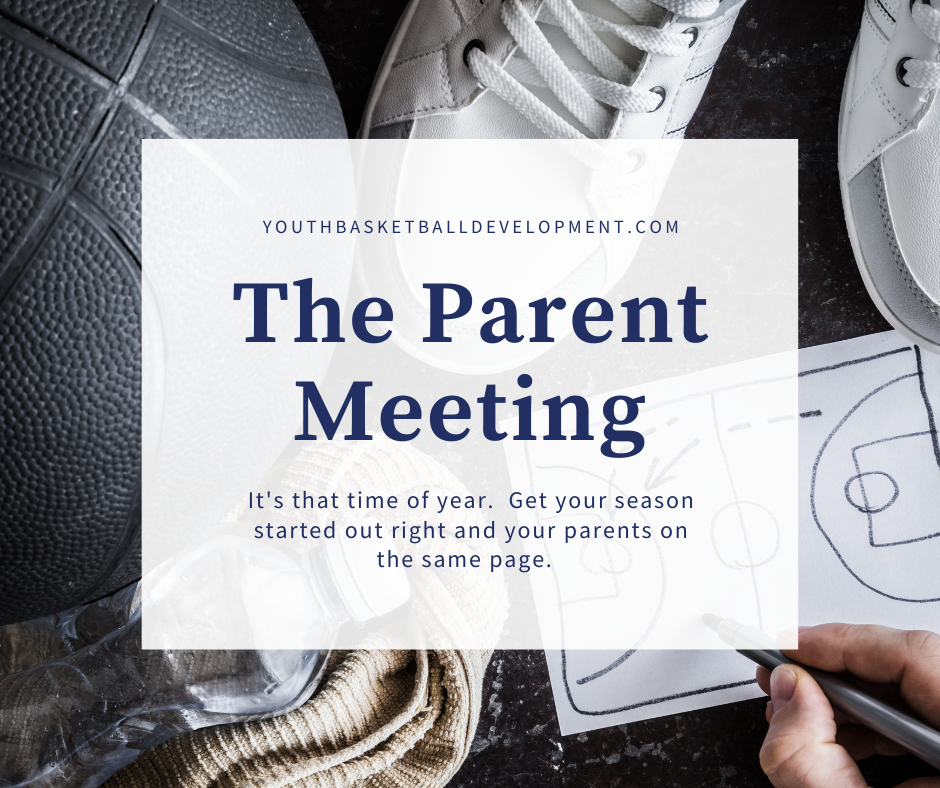LEARN
|
Parents have a tremendous influence on their children and it is important to include them to help influence a positive atmosphere. We recommend having an inclusion mindset versus one of confrontation as supportive clear minded parents tend to have coachable non-excuse making kids. During your parent meeting a good agenda to follow would be a brief introduction of yourself (no need to list all your accolades or accomplishments), your team core values and standards, clear expectations in regard to the parent-player-coach relationship, playing time considerations, logistics and scheduling, and close with answering of any questions.
As previously stated by having clear core values you help set a foundation for positive behavior both on and off the court. It also becomes clear to your parents that you care about more than basketball, that you care about the development of their child as a person. Parents will also have a better understanding of what helps guide your decision making and can assist with reinforcing. We do not recommend a long list of rules beyond these core values but rather two to four standards for your players that your parents have an understanding of. An example of standards may be having fun, great effort, being on time, and no whining or complaining. Discussing the parent-player-coach relationship helps set clear communication expectations. In regard to the parent-coach relationship, a parent should expect to know your coaching philosophy and core values, team and schedule requirements, fees, and how playing time is decided. As a coach we expect parents to express any concerns directly to us versus in front of their child based on their strong influence. Concerns should never be addressed immediately following a contest since when emotional the best words and decisions are not chosen. Parents should encourage their child to voice any concerns they may have to their coach directly with their parental support and notify you of any schedule conflicts in advance as appropriate. Things that are appropriate for parents to discuss with you as a coach include the treatment of their child either mentally or physically, behavior concerns of their child, and ways to help their child improve but we recommend team strategy, play calling, or discussion of other kids on your team as not being appropriate. We also recommend not discussing playing time if it is coaches discretion at the age you are coaching which we will review later. In the parent-player relationship, Bruce Brown, founder of Proactive Coaching, recommends that if your child is in a safe and appropriate environment, “Release your child to the game.” By doing this as a parent we improve our child’s ownership, enjoyment, and intrinsic motivation for playing basketball. As a parent, setting high standards for our children in regard to effort and values is ok as long as it is within their control (not based on winning) and clearly communicated. Also, parents should avoid the PGA, or post game analysis as if done consistently it becomes toxic for your child’s enjoyment of the game. For the coach-player relationship, tell your players it is an open door to discuss playing time and to communicate any concerns you may have in a respectful and direct manner. Tell them that this takes courage of which you greatly appreciate. We also recommend telling your players to not compare themselves to others and focus on the things they can control such as their attitude and effort. As a coach it is important that your expectations and standards for your players are simple and clear. Playing time concerns tend to be more of an issue as players get older when playing time is no longer equal. In alignment with USA Youth Basketball we recommend equal playing time for ages seven through eight years old, equal playing time for ages nine through eleven years old with coaches discretion the last two to four minutes of the game, and full coaches discretion for ages twelve and above with common sense being utilized. As long as there are no serious behavior concerns we recommend that every one of your players gets into the game and plays. Most youth associations have clear guidelines that you will need to follow in regard to playing time which may slightly differ from above such as equal playing time through sixth grade with coaches discretion following. As a youth coach these guidelines can simply be communicated to your parents. If it is coaches discretion at the age you are coaching there will be multiple factors that go into you or your staff’s decision on your player’s playing time. These factors should be communicated to your parents and players and include skill level, behavior and work ethic, athleticism, practice and game performance, and potential match up considerations. Summary
0 Comments
Leave a Reply. |
Archives
April 2024
Categories
All
|

 RSS Feed
RSS Feed